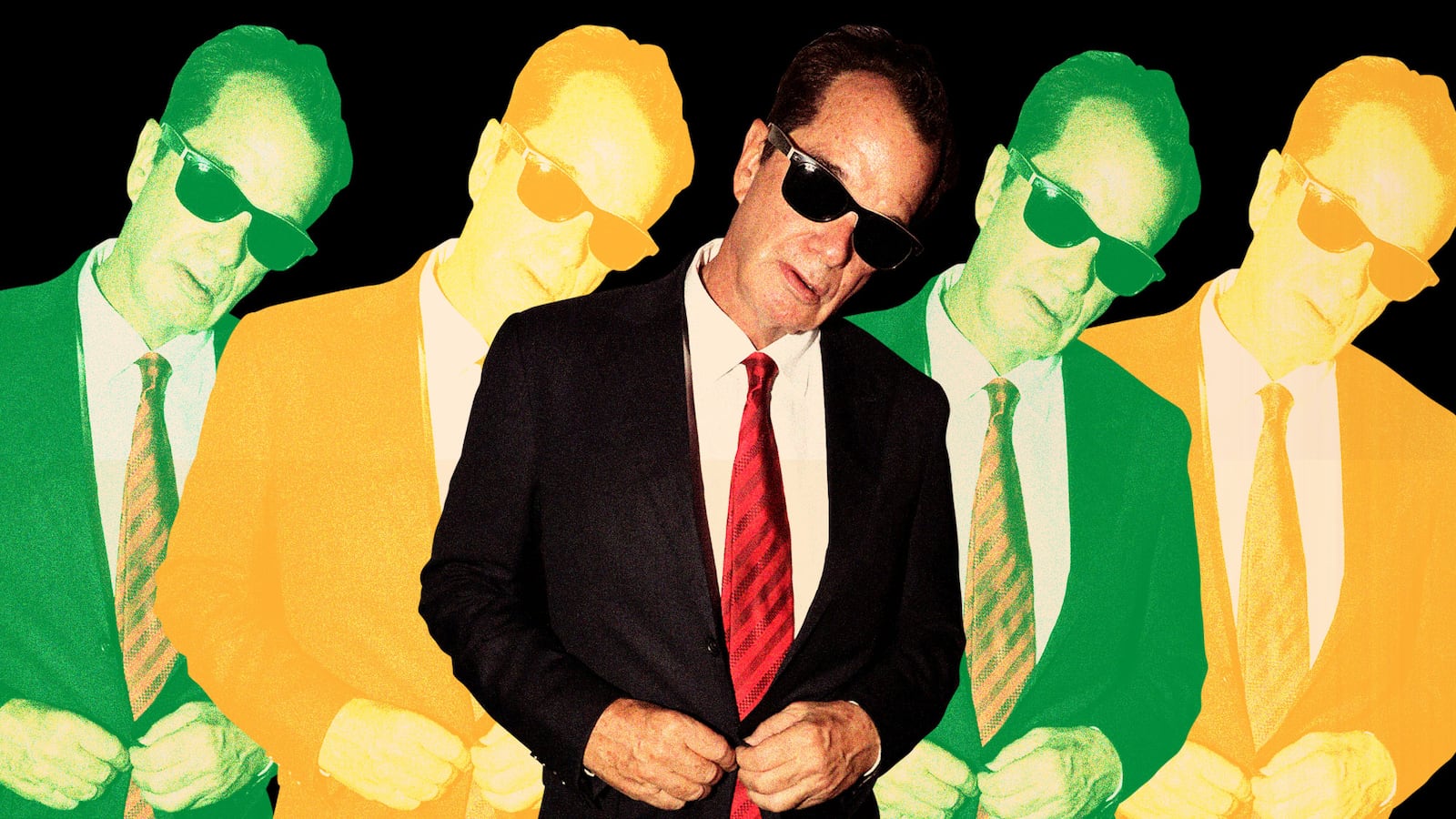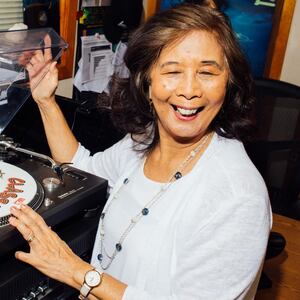Jamaican reggae music has an unlikely yet passionate ambassador—a white American businessman of a certain age who is investing big energy and even bigger money to spread the gospel of reggae and lure tourists to its source. His name is Joe Bogdanovich. This California native could have invested his fortune anywhere in the world, but he chose the island nation of Jamaica. He doesn’t like to talk about where his money originally came from, but it is well known that he is the grandson and heir of the late Martin J. Bogdanovich, the founder of StarKist Tuna.
“There’s a lot of poverty here,” Bogdanovich says of the Caribbean island with just 3 million inhabitants, roughly the population of Brooklyn. “But there’s also a lot of talent. Talent means there are a lot of opportunities. It’s a small enough country that you can make a difference. I really believe that, and some people say I already have.”
Bogdanovich’s investment in Jamaican entertainment remains unmatched and has silenced suspicions that he’s yet another white man trying to exploit the native culture for his own gain.
Just recently his reggae festival Sumfest 2022 pumped $20 million into the Jamaican economy. It was the culmination of Bogdanovich’s involvement in Jamaica that dates to 1999, when he moved his Los Angeles company DownSound Records to Kingston and began developing local talent that eventually crossed borders, including Nuff Nuff, Ninjaman, Elephant Man and Nanko. In a tale straight out of the hit movie The Harder They Come, Nanko had come from the countryside to Kingston and worked as a squeegee man until his musical talent was discovered. Bogdanovich even made his business tactics and problems public by putting himself in a humorous music video pitting Ninjaman against the upstart Specialist Dweet.

Beres Hammond (L) and Shaggy perform during Reggae Sumfest on July 28, 2013 in Montego Bay, Jamaica.
Shelby Soblick/Getty ImagesFrom producing records, Bogdanovich expanded into staging music festivals, beginning in 2015 with the long-running Sting festival on the rough outskirts of Kingston. Clashes, in which artists onstage put down their opponents, often turned into violent showdowns. One of the most notorious was Supercat vs. Ninjaman in 1991, which was cut short when the audience rained bottles on the performers. Even more infamous was a 2003 clash between Vybz Kartel and Ninjaman, when Kartel and his entourage physically assaulted their opponents. When the violence scared away sponsors, the festival’s owner contacted Bogdanovich.
“When I got the opportunity to put my name on this festival called Sting, the baddest concert of Jamaica, I jumped in head first,” Bogdanovich says. “To me this was just awesome. This was the wildest Wild West of Jamaica. It was the last chance for Sting to get some sponsorship. I held my neck out to keep this 30-year-old product alive because I could not allow another festival to go out of business.”
Bogdanovich went to work and found additional sponsors after promising a more commercial approach without the renegade excitement, gunshots, excessive drinking, and violence that had scared sponsors away. He also sent the festival out into the world—to 179 countries via Comcast pay-per-view. “We were even on schedule with a start time,” he says. “It ended without the use of bad words, violence, or stampedes. That was something that never happened before, and sending it out to that many countries has never happened before or since.”
When millions of viewers worldwide pirated the stream, Bogdanovich was unfazed. He realized that this was actually a good thing, a vast expansion of the audience. Since then, his festivals have streamed for free. “This is how you get a big fan base that will come to Jamaica to see the festival in person,” he says. “It furthers tourism.”
In 2016 DownSound Records acquired the major Jamaican music festival Reggae Sumfest. Since then, the festival has grown exponentially in both size and quality. Now the biggest reggae festival in the Caribbean and one of the biggest in the world, Reggae Sumfest is held at Catherine Hall, a beautiful park on a Caribbean beach in the north of the country, near already tourist-friendly Montego Bay. Bogdanovich has leased the property for 30 years for a sum he describes as “very expensive and a big commitment.” He doesn’t like to talk about money, but he will say that Sumfest has ignited a financial boom. “In 2019 Sumfest has brought in more than $10 million (U.S.) to Montego Bay and the country of Jamaica,” he says. “This year, we doubled that in a six-day period. That’s hotels, airplanes, and restaurants, all the way down to the little peanut seller. Now I want to do several of those festivals on an annual basis. Can you imagine how this can heat up the Jamaican economy?”
The prestigious Sumfest is also a golden opportunity for Bogdanovich to showcase the new talents he has signed. At the moment he is promoting three artists, the veteran Harry Toddler, and two young artists. “There is D’ayni, and he might cross over into the international market,” Bogdanovich says. “He’s a great writer, attractive, the ladies love him, and he’s nice to work with. The other one is Marcy Chin, a dancehall artist. She’s becoming a very entertaining performer, she could bust any minute now.”
Sumfest now features a variety of artists, ranging from younger, more R-rated dancehall artists to old-school roots reggae, including the indelible Beres Hammond. At this year’s festival, Bogdanovich honored the artist Spice by crowning her the Queen of Dancehall. This is one of the most beautiful aspects of reggae—the absence of any age segregation, as old stars and up-and-comers gladly share the stage. Regardless of the age of the artist, the audience is also always a mix of young and old, partying together far into the night.

A general view of atmosphere at Reggae Sumfest on July 28, 2013 in Montego Bay, Jamaica.
Shelby Soblick/Getty ImagesRight now Bogdanovich is improving the Sumfest location at Catherine Hall, making this venue even more attractive. Construction of hotels and restaurants is underway. While he is certainly in love with Jamaican culture and music, Bogdanovich is also a shrewd businessman. He’s the chief executive of Hardware and Lumber, the largest retail chain on the island, which stands to profit handsomely from his improvements at Catherine Hall.
The venue will also house the biggest reggae archive in the world, which Bogdanovich recently bought from his long-time friend Roger Steppens in California—for, yet again, an undisclosed sum. The archive contains rare unreleased recordings, pictures, manuscripts, books, knick-knacks, and paraphernalia, plus a wealth of material from fans around the world.
But the archive needs to be sorted, curated, and properly housed and displayed. For now, the Bob Marley Museum in Kingston is the most visited museum in Jamaica, but Bogdanovich’s archive could steal that title, especially since it is heavy on Marley memorabilia. “It will give you a real feel for the life that embodies reggae music, it’s a living thing,” Bogdanovich says. “The archive belongs in Jamaica. I’m bringing it home.”
When one considers the many activities of this Jack of all reggae trades, one pictures a dynamic young businessman. But Bogdanovich, who declines to disclose his age, was a student at Boston University when President John F. Kennedy was assassinated. He recalls the ’60s as “a time when John Lennon sang ‘Give Peace a Chance,’ Black and white color barriers were broken down, and ‘Peace and Love’ was the operating mantra of my generation. To this day I’m influenced by that kind of thinking. How to get unified, how to stop killing everybody, how to stop wrecking the planet. This got out of hand. I’m asking myself what can I do about that? Here in Jamaica with the music, I can make a difference.”
In pictures, music videos. and TV interviews over the last 30 years, Bogdanovich’s appearance has not changed. He’s always hiding behind dark sunglasses, doesn’t have a gray hair on his head, and wears shirts decorated with his company logos, always with a few top buttons left open. But if you do the math, this dynamo is pushing 80.
His appetite for new projects is still relentless. Right now he’s in the middle of his first venture into publishing—a book called Reggae My Life. “It gave me the opportunity to put one more jewel in my Jamaican playbook,” he says. “I’m signing right now with major outlets around the world. It’s a story about Copeland Forbes and his various travels, as one of the most important ambassadors of reggae. That’s important to me.”
It remains to be seen if all his activities will have an impact in the U.S. Reggae is the preferred music of many of the 4.4 million Caribbean immigrants living in the United States. About 13 million of the U.S. population have Caribbean ancestry. Despite this sizeable market, if one judges by the Billboard reggae charts and concert attendance, then reggae’s appeal in this country lags far behind the rest of the world. In 2021 the No. 1 reggae album sold in the United States was Bob Marley’s Legend, which was originally released in 1984. At a recent sold-out show by venerable Beres Hammond at the Coney Island Amphitheater in Brooklyn, all but a handful of audience members had ties to the Caribbean. Meanwhile, this year’s Grammy for best reggae album did not go to one of the Jamaican finalists—Spice, Etana, Gramps Morgan, or Sean Paul—but instead went to SOJA, a white band from Virginia tricked out in dreadlocks.
It might be understandable that driving, rough-edged dancehall has a limited appeal in America, since the lyrics are mostly sung in native Jamaican patois and are impossible for most English speakers to understand. Americans seem to prefer smooth, old-fashioned reggae that would not be out of place in an elevator. After 140 consecutive weeks atop the Billboard charts, Marley’s Legend was recently dethroned by Wisdom, an easy-listening reggae album by a white band from California called Stick Figure. Of course, Bogdanovich is aware of these hurdles as he thinks about how to reach a broader American audience. “Thank God we’re in a transition where young people are doing old-style reggae again,” Bogdanovich says. “Chronixx, Protoje, and Lila Iké—these are the people right now reviving real Jamaican reggae culture.”
Bogdanovich believes that tourism to Jamaica will spark more interest in reggae among Americans, and he’s delighted that more tourists visited Jamaica this past summer than at any time in the nation’s history. “When you visit a festival,” he says, “you experience more than just music; you experience the people, the food, you experience a culture, and it’s really kind of magical, it really is.” But in the end, there is only one viable solution for Bogdanovich. “To get Americans more interested in authentic Jamaican music, for me it’s really quite simple: I have to produce hit records. Hit records connect and cross borders. The music has to penetrate the soul, it has to get through.”
There’s a chance that this unlikely reggae ambassador—this white octogenarian from California—just might break through.






